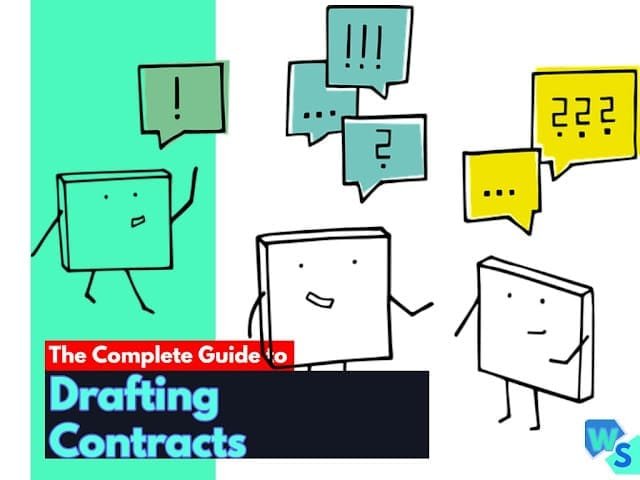Article by Sugandha Nagariya.
How to Properly Draft Agreements and Contracts: The Definitive Guide
Knowing how to draft a contract is an important skill to acquire by a lawyer, entrepreneur, freelancer, employee, employer or human resource professional as it saves you from legal difficulties arising in future, related to the agreement made.
So, in this article I’ll go through the nitty-gritties on How to Create a Contract (i.e., Agreement), what are the Pre, and Post conditions which you need to keep in mind while drafting the same.
What is a Contract
A contract is an agreement between the parties to enter into a legal relationship, which binds them to certain clauses and obligations.
“All agreements are contracts if they are made by the free consent of parties competent to contract, for a lawful consideration and with a lawful object, and are not under any law expressly declared to be void.”
Before drafting a contract, knowing the fundamentals required for a valid contract is very important. We have devoted a separate article to it by and several lawyers and entrepreneurs have contributed to the same.
Here’s the article, but in this post, we have provided a summary of it as well.
Fundamentals of a Valid Contract

#1. Offer and Acceptance
An offer or proposal is an expression of willingness to do or not to do something to obtain the accent of other person. When an offer is made by one party and communicated to the other party to obtain his assent, the other party either accepts it or rejects it or he can make a counter offer.
If he accepts, his act is known as ‘ACCEPTANCE’, and he becomes offeree or acceptor. An agreement comes into existence.
If he makes a counter offer he become the offeror or a proposer and it is upon the original offeror to accept the offer and complete the agreement or reject it.
Related Article by the same author: All You Need to Know about Professional Tax in India
#2. Intention to Create Legal Obligation
An offer must be made with an intention to create legal relationship.
An offer is not a valid offer if it does not create legal obligation upon the other party. Mere trifles or social agreements does not create legal obligation; instead, they create social obligations.
For example: An offer to show a friend a movie or take him/her to a dinner is not be an offer that is enforceable by law. This is because there is no intention to create a legal relationship.
- Note: Often while, creating contracts from scratch, entrepreneurs make a mistake in this area. That’s why it is important for startups to incorporate contract management into their agreement drafting processes.
#3. Consideration
An agreement without consideration is void. Consideration is something of value or worth in the eyes of law.
For example: A makes an agreement with B to sell his property for rupees 50,000. Here B’s promise to pay Rs. 50,000 is consideration for A’s promise to sell the property.
Consideration is therefore the price of the promise. Consideration may also be some act or abstinence on part of the promisee or acceptor at the desire of the promisor and also the consideration or object must be lawful when it is not illegal, or fraudulent, or involves injury to the person or property, or immoral, or opposed to public policy.
#4. An agreement ought to be between the ‘parties who are competent to contract’.
Every person who has attained the age of majority and who has not been disqualified from entering into a contract is competent to contract. Usually, the following persons are incompetent to contract:
- A minor i.e. person below the age of 18.
- A person of unsound mind or insane.
- A person disqualified by law to enter into a contract.
And if the above mentioned persons enter into a contract, the contract must be void ab initio.
#5. Free Consent Of The Parties
Consent is “consensus ad idem”. It means meeting of the minds or identity of minds.
Two persons are said to consent when they agree upon the same thing in the same sense.
For Example: A is an oil dealer selling different types of edible oils. B orders him to supply 100 litres of oil. A sends him 100 litres of mustard oil whereas B thought it to be coconut oil, thus there is no consensus ad idem and as a result A and B agrees on the same thing i.e. is oil but not in the same sense.
Consent is therefore essence of a contract and it must be free. For consent to be free, it must not be vitiated by-
- Coercion
- Undue influence
- Misrepresentation
- Fraud
- Mistake
Mere consent is not sufficient to constitute a valid agreement, thus free consent is must.
#6. Lawful Object Is an Essential Element of A Contract
A contract cannot be made and enforced for an unlawful or illegal objective. I assume you’ve never heard dispute in courts among drug traffickers or smugglers!
Although it differs in different jurisdictions, the following objects and consideration are usually considered to be unlawful:
- It is forbidden by law
- It is of such nature that it may defeat the provision of the law.
- It is fraudulent
- It involves injury to the person or the property of another.
- The court regards it as immoral.
- It is opposed to the public policy.
Agreements, which are specifically declared void, are:
- Agreement in restraint of marriage
- Agreement in restraint of trade.
- Agreement in restraint of legal proceedings.
- Agreement which is not certain or not capable of being made certain.
- Wagering agreements.
- Agreements to do impossible acts.
- Agreement with a minor.
- Agreement without consideration
Questions You Need to Ask For Drafting Contracts for Yourself or Your Clients
The purpose of the questions, which are mentioned below, is to rule out any scope of confusion or dispute between the parties in future and thus helping us to look after every minute details, which may otherwise change the meaning of the contract.
As every contract has to be customized according to the client’s need, thus it is very necessary for the person who is drafting a contract to ask the client what information they need to mention in the contract.
Here are the questions you are required to ask yourself or your client before drafting a contract:
#1. Scope of a Contract
It includes the following:
- Purpose or aim of the contract to be achieved by the client by way of contract. For example if you are selling your land to someone then it is important to know why the client want to sell it, because the purpose of the contract serves the essence of the contract, which you need to draft accordingly.
- Finer details can be explained by the oil example given above (in the free consent part) , i.e. you need to know which type of product you are going to deliver. You also need to know other specifications regarding the product as well as what documents were signed during the origination of the agreement (if any).
- Nature of the good or service being delivered, such as whether they are perishable goods (no delay in delivery is required in these type of goods) or non-perishable goods. This helps the person who is creating the contract to ascertain the targets to be achieved and what is the time required to achieve them so that the needs of the parties are catered.
#2. Payment Decisions
Payment clauses in a contract is a bit complicated. Therefore, you need to take a little more time while you draft it, as you need to keep in mind all the specifications regarding payment clauses.
- Mode of payment is the very first thing that comes when you draft a contract. The mode of payment can be by way of cheque, cash or an electronic transfer or in the form of draft. In addition to that, you also have to be sure of the amount that you have to pay.
For example if someone has deposited a payment in cheque but you don’t accept payment by cheques, you need to have had specified that in the contract clause.
- Installments or lump-sum: You have to specify whether you have to give or want payment as specified in the contract in installments or one time lump-sum payment, because miscommunication in this aspect may mislead the parties and may lead to discord between them.
- Advance or arrears are also required to be determined.
These details help avoid any kind of confusion as well as legal liabilities as businesses are often in the lookout for such clauses so as to boost their working capital management and business finances.
- Currency: You need to mention the currency, that whether it is 100 rupees or 100 dollars or as discussed by the parties, you should always mention the currency before the value.
#3. Incidental or Additional Services
These services are helpful in running the contract smoothly and avoid the dispute during the post contractual obligations.
- Additional services like providing maintenance services require to be mentioned in the contract itself. For example: When you have sold a car to someone, you need to specify if there is any maintenance period or not i.e, if you are required to be liable for the maintenance of the car for some time, from the date of purchase or something like that .
Thus, you need to mention such details in the contract to avoid any dispute relating to such small details in future. In case of large businesses, maintenance services are really important and hence you need to mention it as a clause.
#4. Delivery of the Goods or Services
This is again one of the most important questions when it comes to drafting a contract. It involves:
- Mode of delivery can be a physical delivery or sometimes you need to deliver the software, which cannot be delivered physically i.e. online transfer of the goods. Thus, you need to make sure how your products need to be delivered.
- Would the cost of delivery be added to the final cost or be an extra charge? So are these costs to be included or excluded, should be a question you need to ask yourself before drafting an agreement or contract.
#5. How the Agreement can be Accepted by the Offeree
As stated earlier, acceptance plays an important role in the making of the contract. Thus, you should ask the following questions relating to acceptance:
- Mode of acceptance is important in order to ensure the period in which the acceptance is received by the party and thus it gives an assurance to the other party that they can move further with the same.
- Quality check is the most common way of acceptance. There has to be meeting of minds in terms of acceptance otherwise it would lead to disputes. Thus, you need to ask your client how the goods and services need to be accepted beforehand.
And you also need to put reasonable period of time for the acceptance of such goods or services.
- Payment after acceptance. (Same as mentioned above)
#6. Intellectual Property Matters:
Questions relating to IPR are as follows:
- You have to ask your client, if there are any Intellectual Property being exchanged or shared before you draft it as an IP clause, this is required to make sure that your contract require an IP or not.
- You may ask further questions like your what is the nature of the goods being shared or what are the goods being used for and also if there is any logo which is being shared or exchanged.
This information is only required to take an informed decision.
Related Articles:
- An Explainer into the Indian Copyright Law for Businesses
- How to Register for a Copyright in the US
- How Intellectual Property Laws Protect Trade Secrets
#7. Confidential Information in Your Contracts
You have to ask your client if there any confidential information being exchanged or shared, and if he still wants to put that information in the contract.
Or, you can ask the client what information is being shared and amongst that if you think that there is any information, which is relevant to the business or firm, you can immediately put it under a confidentiality clause.
Steps on How You Can Draft a Contract

- First and the foremost step is to put the names of the parties, address of the parties and the date and time on which the contract took place. It is also required to mention the place where the contract was made and where the acceptance was received.
- Second comes the object of the contract as agreed by the parties.
- Mention the Details of the goods to be sold or purchased or the scope of services to be provided.
- Price of the goods or services are mentioned thereafter including the price of the taxes, packing cost, tariffs etc.
- Duration in respect of the payment, need to be mentioned next as discussed above.
- Next is the Obligations of the parties, to be fulfilled as discussed by the parties, like the representations or the warranties by the buyer to the seller and vice versa.
- After that, you need to mention how the delivery of the goods or services will take place and shipping charges involved (if any).
- Defective good replacement and repair policy should be written next, to develop clarity in the mind of the parties.
- Mention the term of the contract i.e. how many months, years etc., the contract is supposed to last.
- Termination clause, that is how the contract can be revoked by either party or how a party can terminate the contract if the other party does not comply with the rules of the contract is another vital part that you can’t miss.
- Duties, which the parties should perform, should be provided for in the contract.
- Breaches and Damages need to be mentioned, in order to ascertain the liability of the party and the amount to be ascertained or any other punishment as decided, in case the other party to the contract breaches any provision of the contract.
- Confidential information, if any, is to be mentioned.
- You should mention the laws governing the contract. It is especially important in international contracts.
- How will the dispute be resolved should be mentioned i.e, it might be through arbitration, mediation or via a Court of a particular jurisdiction.
- Signature of the parties involved.
There are many more clauses besides these (mentioned above) which depends upon the type of contract which you aim to create.
After the drafting of the contract is done, parties need to stamp the contract if required by law, by paying the stamp duty and sometimes the parties need to get it registered. Check your local legislation or consult a lawyer for appropriate advice in this regard.
Wrapping it Up
Contract drafting helps streamline the relation between two parties as to any agreement between the two.
Drafting a proper contract can help you curb unnecessary difficulties from arising in the future and even help the parties involved to prevent any kind of unforeseen situation cropping up due to the agreement.
Specific Tips for Writing Agreements or Contracts
- The Definitive Guide to a Stock Purchase Agreement (US Law Specific)
- Guide to a Share Purchase Agreement: An International Perspective
- Finance Lease: The Definitive Guide on Creating a Lease Financing
- What is a Sublease and How to Create One
Read Next:
- 70 Startup Mistakes that can be Deadly for Your Business
- 45+ Must-Use Apps that Entrepreneurs can Choose From
- Types of Entrepreneurs Out There
Author Bio: This article has been written by Sugandha Nagariya, a law student, pursuing BLS.LLB at Government Law College, Mumbai and an intern at Winsavy. Connect with her on LinkedIn.




















